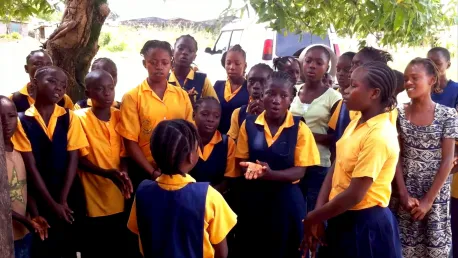
LET US LEARN LIBERIA: SAFE LEARNING SPACES FOR GIRLS
Since the start of the Let Us Learn in 2011, over 200,000 children, adolescents and teachers have been supported by the program in Liberia.
The situation for children and education in Liberia
Generations of children in Liberia have faced severe disruptions to their education due to years of civil conflict and disease outbreaks in the country, including the COVID-19 pandemic.
Girls have been disproportionately impacted by these learning disruptions, further instigated by — or putting them at risk of — early marriage, adolescent pregnancy and female genital mutilation.
While girls are likely to face high levels of violence when not enrolled in school, students have reported significant violence in school as well.
During COVID-19 lockdowns, the Liberia government rolled out remote learning packages on digital platforms, radio, TV and printed materials for all students, but many families struggled to support home learning. For some, children's education was deprioritized over generating income to help the family cover basic needs.
UNICEF is working to close Liberia’s gender equity gap in education
Empowering and protecting girls with safe learning spaces and services are at the core of UNICEF’s work through Let Us Learn. Programs include:
Alternative Basic Education: Assisting out of school or at risk of dropping out individuals, mainly girls, ages 14 to 20, the program provides small, instructor-led group learning sessions for two hours, four days a week. Instructors are trained on child- and gender- protection classroom practices and the Let Us Learn Teachers’ Code of Conduct. Learners also receive school supplies to help with their studies.
Girls Equity in Education Program: In partnership with the Ministry of Education, UNICEF helps empower girls in grades 7 to 9 through all-female after school study groups and Girls’ Clubs. The club meets once a week and allows girls a safe space for facilitating open discussions, building life skills, learning about sexual and reproductive health and raising awareness about gender-based violence and education barriers. Schools that host Girls’ Clubs reported an increase in enrollment, retention and academic performance. Through the program, seed grants are also provided to girls developing startups.
Be a Change Agent Program: To ensure bright futures and employability for the next generation, UNICEF supports learners ages 10 to 19 with vocational, small business management, personal finance, literacy, parenting, sexual and reproductive health and psychosocial education and services. Enrolled learners also partake in an internship program.
The pandemic expanded the role of Let Us Learn Liberia. Let Us Learn Liberia staffers are working with the government to procure remote learning resources and serve as guides for educators. Program resources also support Child Welfare Committees in detecting and referring cases of children affected by violence and COVID-19 to psychosocial support services. Further, Let Us Learn Adolescent Peer Educators are delivering trainings on proper sanitation and COVID-19 prevention and response.
Learn more about Let Us Learn in other countries.
Top photo: Girls participate in a Liberia-based Girls’ Club meeting on proper hygiene. ©UNICEF/UNI282181